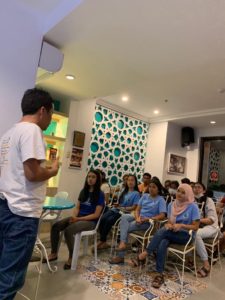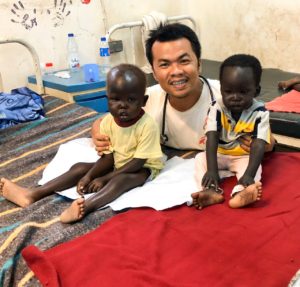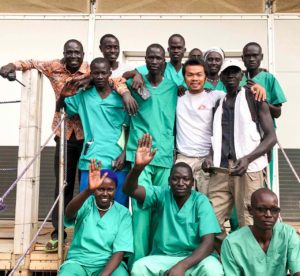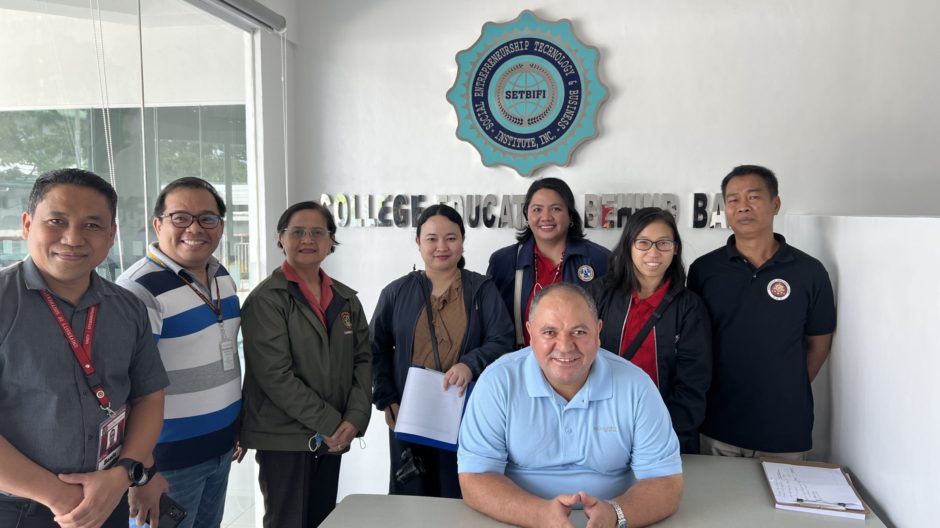

 The last couple of years we have witnessed lots of negatives news about the Philippines; it was news not only here but abroad as well. From the war on drugs, corruption, poverty, typhoons, the Marawi war with fundamental Muslims, the South China Sea dispute with China, a dengue outbreak, and now polio coming back to the Philippines after twenty years, it is quite hard to figure out what is good news especially when the country struggles with image problems. These are some of the general impressions of the world about the Philippines that, while unpleasant, are undeniable true. However, despite the many negative comments that quite often overshadow, positive things are happening, and lots of things to be proud of emerge in the Philippines. The Filipinos are renowned all over the world for remarkable qualities, often downplayed or overlooked, but which nonetheless bring pride to the country. I have observed one of the best traits and distinct assets of Filipinos is that they display a sincerely heartfelt, nurturing spirit and caring touch in the way they interact with those close to them including others outside their kin circle.
The last couple of years we have witnessed lots of negatives news about the Philippines; it was news not only here but abroad as well. From the war on drugs, corruption, poverty, typhoons, the Marawi war with fundamental Muslims, the South China Sea dispute with China, a dengue outbreak, and now polio coming back to the Philippines after twenty years, it is quite hard to figure out what is good news especially when the country struggles with image problems. These are some of the general impressions of the world about the Philippines that, while unpleasant, are undeniable true. However, despite the many negative comments that quite often overshadow, positive things are happening, and lots of things to be proud of emerge in the Philippines. The Filipinos are renowned all over the world for remarkable qualities, often downplayed or overlooked, but which nonetheless bring pride to the country. I have observed one of the best traits and distinct assets of Filipinos is that they display a sincerely heartfelt, nurturing spirit and caring touch in the way they interact with those close to them including others outside their kin circle.
Despite all the negative news that rocked the Philippines, a proud Filipino showed the world that Filipinos are gifted, courageous, loving, strong, compassionate, selflessly as well as eager and always ready to help anybody in need. These traits arise whether here at home or with the Rohingya Muslims from Myanmar at the refugee camp, or going to the country of Benin to assist with surgeries for the indigent, or attending to those in the South Sudan after years of conflict have forced millions of people from their homes and exposed them to extreme violence, so that they fear for their lives. Hundred of thousands of people in the South Sudan are unable to access basic necessities, such as food, water, and healthcare. Jerwin Capuras, a proud Filipino grew up in Compostela Valley in Mindanao, graduated from the University of Mindanao, worked for a few years at a hospital as a registered nurse, and now works for the Doctors without Borders as a register nurse providing basic and specialized health care, responding to emergencies’ and outbreaks affecting isolated communities, and serving internally displaced people and refugees from Sudan. These accomplishments would make anyone proud to be a Filipino.
I think Jerwin has done the best things for his country and for humanity, and he makes all Filipinos glad to call the Philippines home. A proud Filipino puts a smile on the Rohingya refugees Muslims from Myanmar at the refugee camp or on escapees from ethnic or tribal wars in South Sudan. To inspire the students to persevere, Jerwin Capuras spoke at the MCI weekly study forum and shared some of the working experiences he had with the Rohingya Muslims in a refugee camp in Bangladesh, his work experience in Benin, and his service in the South Sudan. He was himself once an MCI scholar, and now he is a professional encouraging other young minds, to help needy people. Jerwin is a one of the greatest examples of many Filipinos here at home and abroad who serves as living examples of the best of the Philippines.
As a Minority Care international (MCIS) scholar, MCI sent Jerwin to the university, guided him, and equipped him during his years with MCI. Jerwin said, “When I was a student and scholar of Minority Care International, I remember seeing the images of the Ethiopia famine on television and women in Africa carrying the water on their heads from the wells for their daily consumption. Attending MCI’s weekly forums and hearing about ignorance, poverty, corruption, HIV-AIDS, violence, ethnic conflict, and climate change, I learned about the love of God and care for others. MCI just did not want me to come to God but also to go for Him, to do the things that are more valuable and precious to God who are His children. Of course, MCI does not just give, but it also teaches us to give back to the community. After I graduated from the University, became a registered nurse, and worked at the Southern Philippines Medical Center (SPMC) for a couple of years ever since then, I knew that I needed to do something, to witness, to give something of myself, and to be a citizen of the world. I must first do something good, like what MCI and Sir Aland did for me, and that will benefit the people who need it most.”
“I remember a long time ago at one of the weekly forums Sir Aland shared with us that MCI believes every one of us has a place in society. That part cannot be played by anybody else in the world. Being poor and underprivileged does not really matter. What matters is that MCI provides as opportunity for motivated young people to obtain an education that will enable them to make the most of their individual gifts. It is fascinating to see that each one has unique gifts with none having exactly the same ones. Besides teaching the students to use their skills and gifts, MCI helps students fulfill their dreams. MCI is a place where those dreams can be achieved and hope can grow. Today the blackboard is clean; the lessons still have to be written. Consequently, it is a day for optimism and hope. Education can help a student to become a nurse, a businessman, a banker, or politicians. Most things may be lost but an education, once gained, may not be taken away. MCI offers a place where seeds of learning are planted with love and care. MCI is a place where students can learn about respect for others, and moral principals, strategies to solve differences in a civilized and conciliatory manner. It is a place where learning is appreciated; therefore, MCI offers some unique opportunities for its students. MCI looks forward to the day when students will be happy and pleased for knowing that here they found the right soil in which to grow and develop, and thus always be proud to claim MCI as home, just as they claim the Philippines. Students will pay forward, learning to invest in others as others invested in them. We at MCI will have that brighter future.”
“During my years as a student in the MCI program, one week at the MCI weekly study forum, Dr. Aland Mizell mentioned about an international charity called Mercy Ship. He explained that Mercy Ship is an international charity based in the USA that operates the world’s largest civilian floating hospital. Mercy Ship has a team of nurses, doctors, and surgeons, dentists, and crew members from all over the world, coming together and donating their time to help on board the hospital. As a ship hospital, they can sail directly to some of the world’s poorest people to deliver life saving medical care and to provide safe procedures in state of the art facilities in order to treat them. I realized I wanted to do volunteer work as a nurse. I observed the remarkable work that Mercy Ship undertakes to bring healthcare to some of the most needy communities around the world. I decided to volunteer with Mercy Ship because they have an excellent track record in delivering humanitarian aid and health care in the developing world, and because I wanted to use my skills to help those less fortunate.”
“My mentor, Dr Mizell, always reminds us that the best investment is in human beings. I have witnessed so many patients going through a life changing experience thanks to the help of MCI for investing in me so that I can invest in others. MCI’s investment did not go vain. I want to thank Dr. Mizell, who guided me, directed me, and corrected me when I was not doing right. I would not be here and doing all the good without the help of MCI. You don’t need to be a saint, a genius, or the next winner of the CNN hero or even the TV show talent program to bring joy to others with your gifts and heartfelt touch. We all should give without worrying about our imperfections and should not be discouraged by what we see as our limitations. Our gifts and talents are only as great as we allow them to be. If we feel the need, read books or take a class to improve our skills. But it is by using our gifts and seeing the happiness we bring that we gain the greatness confidence. Our gifts and talents will grow if are continue to share them. By helping others, we often help ourselves as well. When we stop giving, that’s the time we stop growing.”
“I believe that God wants us to invest the talents he has given us, and if we do, he will reward us with greater opportunity and deeper fulfillment. When I was done with my short-term volunteerism on Mercy Ship, I wanted to look for a career job like that, so I met some other doctors and nurses, and they told me good things about Samaritan’s Purse and recommended that I apply for the organization, and I did. They hired me as a nurse. Samaritan’s Purse specializes in meeting critical needs for victims of conflict, disaster, famine, and epidemics throughout the world, often working through faith based groups on the ground. They provide food, water, shelter, medicine and other assistance. Samaritan’s Purse has a disaster response team on the ground to assist increasingly anguished Rohingya Muslim refugees from Myanmar into Bangladesh. I was assigned to assist Rohingya refugees to witness heart breaking stories and share with them hope I have. I remember Sir Aland always telling us to be prepare and to be ready, because opportunity will come, and we would need to be ready and prepared to grab the opportunity because opportunity will not wait. If we are not properly prepared and ready, we might miss the opportunity.”
“The Rohingya Muslims’ crisis was a humanitarian and human rights nightmare. Our team was exploring ways we could best assist the people and meet their pressing needs in the name of our most precious name Jesus Christ. To provide good health care to refugees, Samaritan’s Purse built a surgical ward at a longtime partner hospital. Also, Samaritan’s Purse was working to provide food, tarps, and clean water safe for drinking, along with non-food items to help alleviate the harsh conditions there. I saw first hand the value of my work because these people are very vulnerable people who need our help. What they needed was hope. I saw suffering and heard story after story first hand. The Rohingyas told me how their family members had been killed, their land seized, and their homes and villages burned as they fled from the waves of attacks in Myanmar. These people went through hell, but when you go through hell, what you need is hope, so that’s why we were there offering them hope. I told them that I am a Christian, but we care and love them because God loves them. We pray God will intervene for them. Samaritan’s Purse gave me another assignment to a country in the Middle East and had some visa requirement for non-American citizens and that delayed my assignments.”
“I had already met some staff from Médecins Sans Frontières on the field, and they told me they are hiring, so I applied and went through a couple of interviews and was hired by Doctors without Borders. I wanted to use my medical background in places and for people that have so much less than we do. I found out more about the work and values of Doctors without Borders and decided it was something I would love to be part of. On my first mission to Sudan, it didn’t take me to realize that this experience would be truly challenging. Sudan has been wracked with Civil War, when most of its infrastructure was destroyed. Lawlessness, disorder and tribal warfare are big problems in the Sudan. At home I am used to see our military with guns, but I was not used to being around citizens with guns, to work in the absence of a government, of laws, or hospitals, but yet Sudan is a beautiful country. People are great and their resilience and endurance were forever a motivating factor for me. I treated patients with the least possible resources. We performed miracles, and I witnessed a few miracles myself. We were doing surgeries inside a tent in the middle of nowhere without oxygen, without monitors, and without high tech equipment, and yet despite the limited resources, we still managed to save lives. I was the only proud Filipino nurse with Doctors without Borders training group of a local medical team at the refugee camp.”
“Sudan is facing crisis with the civilian war population targeted by rebel groups. On a daily bases, we witnessed the aftermath of horror and situations which deeply affected aid workers. It was frustrating to realize that even the most basic medical treatment remained inaccessible for parts of the population. But not only was medicine hard to get but also basic needs and even food as well. We found out a village did not have anything to eat and that they just eat grass and roots to keep them live. And yet, I was amazed by the kind and openness of the population. They were using a donkey as an ambulance, because they did not have any other means to bring a sick person to get the care for him or her. I was overwhelmed that in a place where people have nothing and are stripped of their most basic resources, still have happiness.”
“I have learned in my three assignments in Benin, Bangladesh, and Sudan to be content with what we have. Sir Aland always says to appreciate the things before you loose them, appreciate the freedom before you loose it, appreciate health before you get sick, appreciate people before you loose them, appreciate your country. I have learned to appreciate what we have in the Philippines. On a professional basis, working with the Doctors without Borders helped me to adapt to any situations that arises, as there will always be something new to understand. Our knowledge will be pushed to its limits. It was very hard for me to see children dying from totally preventable diseases and people without access to clean drinking water, or clean water to bathe or cook with or without shelter. I believe everyone has the right to health care. I believe that a person’s dignity if nothing else, even if the face of death, is important. That’s what makes me hopeful, and I am more proud and thankful what MCI has invested in me, and I am trying to share with other. Hoarding our gifts and talents gives us nothing back to the world or to God from whom we have received so much blessings. I am very proud to be a Filipino serving and helping others who are the most needy ones.”
“I still want to do more. As a nurse, we serve as an advocate for our patients, a caregiver, a counselor, a change agent, and a clinician. Even though, sometimes in my mind, I wish I could have done more, and believe that I am not doing enough for them, I hear patients say, “Thank you,” or seeing them satisfied with care and love I have given them makes me happy. It makes me feel that I have used my life purposefully. Whatever God is involved with always produces good fruit. When we look at our life, we see increase, we see multiplication, and we see productivity. We see ourselves birthing new ideas, new strategies to win the lost souls into God’s Kingdom. That is God’s ultimate desire for every one of us. Service and compassion are above all else. Dr. Mizell said, ‘A young person is a sapling of power strength, leadership, and intelligence that if trained and educated properly, he or she can become a hero by overcoming obstacles and acquiring a mind that promises enlightenment to hearts and order to the world.’”

